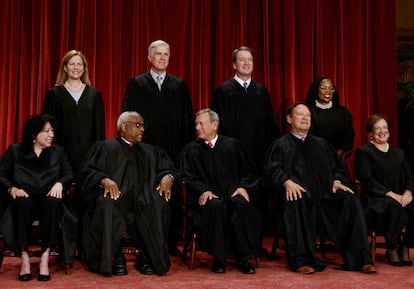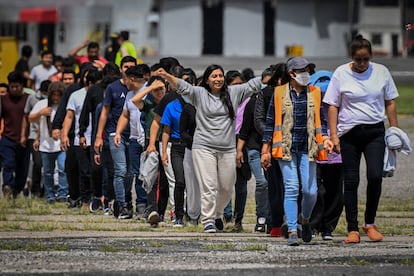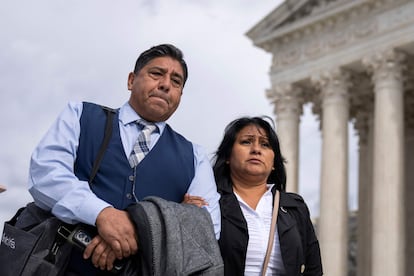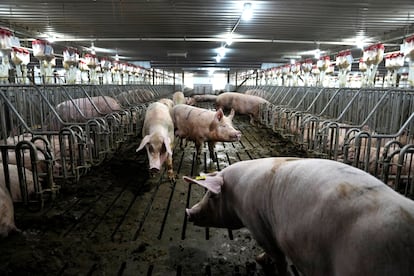The 12 most controversial Supreme Court rulings this year: From education to religion
The court hardened its turn to the right at the end of the legal year, but oftentimes, the justices have also sought (and found) consensus


The conservative revolution launched by the Supreme Court of the United States continues.
At the end of the latest legal year (2022-2023), a handful of rulings were made — some of which will directly affect the lives of millions of Americans. Many of these decisions are marked by the sharp right turn that the court has taken, since former president Donald Trump appointed three justices during his term (2017-2021), establishing a comfortable conservative majority (6-3). However, compared to the previous legal year (2021-2022) — which often saw judgements split between six conservative justices and the three liberals — this past session has seen several decisions supported by the Democratic-appointed justices.
In 2022, controversial rulings repealed the right to abortion, undermined the fight against climate change, expanded the right to carry firearms, gave religion a greater role in schools, questioned the mandatory vaccination of workers against Covid and reduced the power of federal agencies. This year, the court seemed more focused on decisions related to voting rights, Indigenous rights, or the immigration policy of the Biden administration (which justices of different ideological positions agreed on).
What has generated the most controversy, however, was what happened last week, when the conservative majority dealt a blow to affirmative actions in post-secondary education, authorized the ability to discriminate against same-sex couples by virtue of freedom of expression, while annulling the partial forgiveness of student debt.
The following rulings from the past legal year are among the most impactful ones, with some having resulted in an open confrontation between President Joe Biden and the Supreme Court:
1. Affirmative Action
Students for Fair Admissions, Inc. v. President and Fellows of Harvard College and Students for Fair Admissions, Inc. v. University of North Carolina. Ruling on June 29, 2023. Six votes in favor of both cases, two and three against each case respectively (Justice Jackson recused herself from the first).
The Supreme Court of the United States dealt a death blow to decades of affirmative action — or “positive discrimination” — in relation to disadvantaged racial groups being able to gain access to university. In two historic rulings — one dealing with Harvard University and the other with North Carolina University — the Supreme Court’s six conservative justices put an end to a policy that has traditionally favored mainly Black and Latino students.
The decision — including the dissenting opinion — took up 237 pages. It saw the conservative majority impose its view on the issue. “Eliminating racial discrimination means eliminating all of it,” wrote Chief Justice John Roberts, who was appointed by George W. Bush in 2005. The ruling has generated verbal attacks within the court, as well as a sharp split along partisan lines. President Joe Biden harshly criticized the ruling, while his predecessor — Donald Trump — applauded it.
Nine states have already prohibited race from being taken into account in the post-secondary admissions process. The numbers show that minority representation has decreased significantly as a result of this. Many universities are now looking for ways to achieve diversity through other means, by working around the Supreme Court’s revocation of the measure.
A section of the judgment notes that, in admissions decisions, universities may take into account “an applicant’s discussion of how race may have affected his or her life, whether [due to] discrimination, inspiration, or otherwise.” However, it is stipulated that this must be done on an individual basis — explicit or implicit racial quotas are now prohibited. Hence, the door is now open to a somewhat more subjective admissions process.
2. Student Loan Forgiveness
Biden v. Nebraska. Ruling on June 30, 2023. Six votes in favor, three against.
Last Friday, the Biden administration — along with tens of millions of college students — faced a setback when the conservative majority on the Supreme Court annulled an earlier sentence regarding the forgiveness of debt from student loans that were granted by the Department of Education. The high court’s ruling especially harms students with fewer resources, particularly Hispanics and African-Americans.
The president, however, has promised to apply a new formula to alleviate the burden of student debt, while lashing out at Republicans, accusing them of hypocrisy for fighting against his proposal for debt forgiveness, while helping reduce the tax burdens of high-income Americans:
“These Republicans in Congress are shamelessly pushing to advance a bill in the coming weeks that gives hundreds of billions of dollars in tax breaks and handouts to the wealthiest Americans,” Biden said.
Biden’s administration had decided — based on a provision of a law called HEROES, passed after 9/11 — to grant $10,000 in student debt forgiveness per person across the board. The figure could go up to $20,000 for Pell Grant recipients — a widespread federal program that sees loans from the Department of Education benefit some six million students from low-income families. The measure involved the cancellation of some $400 billion in student debt.
In the ruling, the majority warns that “the HEROES Act allows the Secretary [of Education] to ‘waive or modify’ existing statutory or regulatory provisions applicable to financial assistance programs under the Education Act, but does not allow the Secretary (Miguel Cardona) to rewrite that statute.”
3. LGBTQ Discrimination
303 Creative LLC v. Elenis. Ruling on June 30, 2023. Six votes in favor, three against.
Lorie Smith — a 38-year-old evangelical Christian web designer, who only believes in marriage as a union between one man and one woman — is now permitted to refuse to design web pages for gay weddings. The Supreme Court’s conservative majority has ruled that services can be denied to same-sex couples, in a blow to LGBTQ+ rights. The designer said that no one could force her to attend gay clients, by virtue of freedom of expression, which is enshrined in the First Amendment of the American Constitution. The highest court has agreed with her.

“The First Amendment’s protections belong to all, not just to speakers whose motives the government finds worthy. In this case, [the state of] Colorado seeks to force an individual to speak in ways that align with its views but defy her conscience about a matter of major significance,” the sentence reads.
The dissenting opinion of the three progressive justices condemns the ruling: “Today, the Court, for the first time in its history, grants a business open to the public a constitutional right to refuse to serve members of a protected class. Specifically, the Court holds that the First Amendment exempts a website-design company from a state law that prohibits the company from denying wedding websites to same-sex couples if the company chooses to sell those websites to the public.”
The decision doesn’t specify which firms are included under this ruling and, therefore, have “a license to discriminate,” as an activist has pointed out. The case has become central in the culture wars that the conservative majority on the Supreme Court has been willing to wage.
Smith does not yet have a wedding website service and has not been commissioned by any gay couple. But she claimed she wanted to launch the service and posted a warning, refusing outright to serve clients for gay weddings — something Colorado state law prohibits.
4. Immigration and Deportations
United States v. Texas. June 23, 2023. Eight votes in favor, one against.
The Supreme Court concurred with the Biden administration on its undocumented immigrant deportation policy. In a ruling with only one dissenting vote — by Judge Samuel Alito, who was appointed to the bench by George W. Bush — the court upheld a Biden policy that had been suspended by a Texas court. The federal guidelines — issued in 2021 — prioritize the expulsion of immigrants who are considered to pose a greater risk to public safety, or who have been intercepted by law enforcement after recently crossing the border.
The Republicans demanded that all immigrants without papers should be deported and that it wasn’t lawful to set priorities, because this essentially delayed the expulsion of certain migrants. According to the Texas and Louisiana state governments, federal immigration law requires authorities to detain and deport even those who pose little or no risk. The Supreme Court ruling in United States v. Texas acknowledges that there isn’t enough money — nor sufficient personnel — to deport the nearly 11 million people who are estimated to be in the United States illegally. Therefore, priorities are logical. Above all, the high court denied states the ability to challenge such federal decisions.

“The states have brought [forward] an extraordinarily unusual lawsuit,” wrote conservative judge Brett Kavanaugh, who delivered the ruling. “If the Court green-lighted this suit, we could anticipate complaints in future years about alleged Executive Branch under-enforcement of any similarly worded laws — whether they be drug laws, gun laws, obstruction of justice laws, or the like. We decline to [send the federal judiciary] down that uncharted path.”
5. Voting Rights
Allen v. Milligan. Ruling on June 8, 2023. Five votes in favor, four against.
The Supreme Court unexpectedly rejected Alabama’s proposed electoral map, on the grounds that it discriminates against Black voters. In a state with a population that is 27% African-American, the state legislature — dominated by the Republican Party — drew up districts for the House of Representatives, in which Black voters were only a majority in one of the seven constituencies. A divided court upheld a lower court’s ruling, annulling said map.
The Allen v. Milligan case has been closely watched for its potential to undermine the historic Voting Rights Act (1965). Activists feared a negative ruling, but the conservative majority on the Supreme Court unexpectedly broke ranks in deciding the case. Two of the right-wing justices sided with the three progressive judges in the decision, which was 5-4. The ruling was almost entirely written by Chief Justice John Roberts. His opinion was supported by the conservative Brett Kavanaugh, along with progressive justices Sonia Sotomayor, Elena Kagan and Ketanji Brown Jackson. The other four conservative judges opposed the annulment of the electoral map and formulated individual dissenting opinions.
6. Independent State Legislature Theory
Moore v. Harper. Ruling on June 27, 2023. Six votes in favor, three against.
This was another moderate victory within the judiciary. A divided Supreme Court rejected a Trumpist theory that put the future of democracy in the United States at stake. In Moore v. Harper, it was proposed that the North Carolina state legislature (and, by extension, all other state legislatures) be granted the ability to regulate elections as they so choose, with the risk of manipulating the will of the electorate. State bodies would even have the ability to alter the rules by which state electors are appointed for the election of the president. The justices rejected this notion, which is known as “Independent State Legislature Theory.” This doctrine asserts that state legislatures have sole authority to establish federal election laws, without review by state courts or governors.
The case under review arises from the fact that the Supreme Court of North Carolina decided to annul the electoral maps drawn up by the Republicans in the state legislature. These demarcations were considered to be far too partisan and artificial — an extreme case of gerrymandering. Timothy Moore — the speaker of the North Carolina House of Representatives — appealed the court’s ruling, advocating for Independent State Legislature Theory.
The Supreme Court rejected this doctrine, noting that the constitution “does not exempt state legislatures from the ordinary restrictions imposed by state law.” The position of three conservative judges — the more moderate ones — has been decisive in this ruling, as they aligned themselves with the progressives in a 6-3 vote. Together with the conservative Roberts, Kavanaugh and Amy Coney Barrett, the three progressive judges (Kagan, Sotomayor and Ketanji Brown) voted against the hard-line Samuel Alito, Clarence Thomas and Neil Gorsuch, who each wrote dissenting opinions. In the oral hearings, they already showed their sympathy for giving more power to state legislatures, which are mostly controlled by Republicans.
7. Social Media and Terrorism
Gonzalez v. Google LLC and Twitter, Inc. v. Taamneh. May 18, 2023. Unanimous ruling in favor of Google and Twitter.
The Supreme Court sided with Twitter, Google and Facebook in these rulings. The three tech giants had been sued for the dissemination of messages from terrorist organizations on their platforms. In one case, the judges rejected that this implies collaboration with terrorism. The other case was referred to the lower courts, to follow the same criteria. For now, these companies have been shielded from the consequences of the content uploaded by users. However, the judges have avoided ruling on the scope of this exemption from liability — they seem to be reserving it for a better occasion.

In the unanimous decision, the justices noted that it’s not enough for terrorist organizations to use social media sites to hold the tech firms civilly responsible for collaborating with terrorism. In the case of Twitter v. Taamneh — a lawsuit filed by the relatives of a victim of the Istanbul nightclub shooting, on New Year’s of 2017, in which 39 people died in the terrorist attack — while the case bears the name of the social media company owned by Elon Musk, Google and Facebook were also part of the lawsuit. In the lower courts, judges had ruled against the technology companies, who then appealed to the Supreme Court and won.
8. Animal Cruelty and Interstate Commerce
National Pork Producers Council v. Ross. Ruling on May 11, 2023. Five votes in favor, four against.
“While the Constitution addresses many weighty issues, the type of pork chops California merchants may sell is not on that list,” wrote Justice Neil Gorsuch, in a Supreme Court ruling that rejected an appeal against a California law that imposes requirements on the raising of pigs and chickens, so that their products can be sold in the state. The so-called “bacon case” divided the Supreme Court, while it has generated controversy regarding interstate commerce.
Gorsuch and four other Supreme Court judges affirmed the validity of the California law. “Companies that decide to sell products in various states must normally comply with the laws of those states.”
The Commerce Clause of the U.S. Constitution gives the Congress the power to regulate foreign and interstate commerce. In the public hearings that were held in October of 2022 in the Supreme Court, a group of farmers argued that the law “violates the Commerce Clause almost by definition [because it’s an] extraterritorial regulation that conditions the sale of pork.”

Legislation to prevent animal suffering was approved by California voters with 63% of the vote. The state government also noted that potential threats that come from pigs being overcrowded on farms can be combatted by this law. California had already passed a similar law that came into force in 2012, which effectively banned foie gras (duck or goose liver) and whose legitimacy was upheld by the Supreme Court.
The farmers’ legal team focused their argument on the fact that the state can ban pork products if it wants to, but it cannot dictate to the rest of the country how the animals should be raised. The judges rejected this. It’s true, the ruling acknowledges, that “no State can use its laws to deliberately discriminate against economic interests [beyond] the state.” But the California law — according to the Supreme Court — hasn’t violated this norm.
9. Copyright Law
Andy Warhol Foundation for Visual Arts, Inc. v. Goldsmith. Ruling on May 18, 2023. Seven votes in favor, two against.
The Supreme Court ruled in favor of photographer Lynn Goldsmith, who, seven years ago, launched a crusade to have it recognized that Andy Warhol infringed her copyright. He created screen prints from a photo of the singer Prince, which was taken by Goldsmith. Basing your creation on a previous work — a widespread practice in contemporary art — can now lead to legal consequences.
Chief Justice John Roberts and progressive Justice Elena Kagan dissented from the majority, in another example in which the justices made their decisions beyond partisan lines.
“Goldsmith’s original works, like those of other photographers, are entitled to copyright protection, even against famous artists. Such protection includes the right to prepare derivative works that transform the original,” wrote Justice Sonia Sotomayor in the majority opinion. Six other judges agreed with her. Sotomayor declared that the use of both images is of a “commercial nature,” while also emphasizing that the Warhol Foundation “offered no other persuasive justification for the unauthorized use of the photograph.”
10. Protection of Water and the Environment
Sackett v. EPA. Ruling on May 25, 2023. Five votes in favor, four against.
Michael and Chantell Sackett have been battling with the Environmental Protection Agency (EPA) for 15 years to build a house on a lot that is about 300 feet from Priest Lake, in Idaho. Shortly after construction began, the EPA warned them that the land likely contained wetlands and would therefore be subject to the Clean Water Act of 1972, which prevents dumping of pollutants, sand, cement and other materials in said areas.
This law isn’t the clearest one that Congress has approved. It protects “the waters of the United States,” referring (in principle) to “navigable waters.” There is no water on the Sackett land. However, on the other side of the road that runs next to the family farm, there’s a wetland that connects with a drainage ditch, which leads to a non-navigable stream that flows into the lake. The EPA deemed the Sacketts’ land a protected wetland under the Clean Water Act and ordered them to remove the construction materials under threat of a fine. The case became entangled in the courts: it first reached the Supreme Court for jurisdictional issues in 2012, before it stalled. Finally, the justices agreed with the couple more than 10 years later, on May 25, 2023.
All nine judges agreed on the merits of the ruling: it was not the EPA’s place to decide whether or not the Sacketts could build on their own property, which was clearly not a wetland. However, the three progressive justices — as well as the conservative Kavanaugh — disagreed with the ruling’s interpretation that the Clean Water Act only protects wetlands that have a “continuous surface connection.”
11. Adoption of Native American Children
Haaland v. Brackeen. June 15, 2023. Six votes in favor, two against.
The judges ruled on the validity of the Indian Child Welfare Act (ICWA), which stipulates that, when it comes to the adoption of an Indigenous child, native families or tribes have preference. A group of Republican activists and white families claimed that the measure is discriminatory and racist — arguments that the court has flatly ruled out.
The norm was approved to protect the sovereignty of the tribes, after Congress verified the high number of children of Native American origin being separated from their families and given up for adoption to people of other origins, or being fostered within state institutions. Throughout history, hundreds of thousands of these minors have been left in this precarious situation, arbitrarily separated from their own families to be assimilated into the dominant culture — that of white families. The ICWA is supported by the American Indian tribes, who see it as a way to preserve their culture — and their families — after centuries of colonization seeking to destroy Indigenous identity.
Only the two most conservative justices — Clarence Thomas and Samuel Alito — opposed the decision. The case pitted a white foster couple from Texas against five tribes and the Department of the Interior, in their fight to adopt a Native American child.
12. Religious Liberty and Employment Accommodations
Groff v. DeJoy. June 29, 2023. Unanimous.
This ruling on religious rights was surprisingly unanimous. “The debate has been productive in finding points of agreement,” Judge Samuel Alito wrote. With it, the Supreme Court has reinforced the protection of workers who request adaptations to their workday for religious reasons. The case concerned a Christian postman who didn’t want to work on Sundays — he said that this day is meant for church and family.
In a unanimous decision, the judges made it clear that workers who request religious accommodations — such as taking Sunday off — must have their requests honored, unless employers show that doing so would result in a “substantial increase in costs” to the company. The judges sent the case back to a lower court for reconsideration, in light of their decision.
Gerald Groff — the mail carrier from rural Pennsylvania who filed the suit — said he hoped the ruling “allows others to be able to stand by their convictions without living in fear of losing their job because of what they believe.” Groff was told that, as part of his job, he would have to start delivering Amazon packages on Sundays. The postman refused, saying that his Sundays are for church and family. At first, officials at the Postal Service tried to find replacements for Groff’s shifts, but they couldn’t always accommodate him. When Groff didn’t show up, it meant more work for everyone else. Ultimately, Groff resigned and filed a religious discrimination lawsuit.
Sign up for our weekly newsletter to get more English-language news coverage from EL PAÍS USA Edition
Tu suscripción se está usando en otro dispositivo
¿Quieres añadir otro usuario a tu suscripción?
Si continúas leyendo en este dispositivo, no se podrá leer en el otro.
FlechaTu suscripción se está usando en otro dispositivo y solo puedes acceder a EL PAÍS desde un dispositivo a la vez.
Si quieres compartir tu cuenta, cambia tu suscripción a la modalidad Premium, así podrás añadir otro usuario. Cada uno accederá con su propia cuenta de email, lo que os permitirá personalizar vuestra experiencia en EL PAÍS.
¿Tienes una suscripción de empresa? Accede aquí para contratar más cuentas.
En el caso de no saber quién está usando tu cuenta, te recomendamos cambiar tu contraseña aquí.
Si decides continuar compartiendo tu cuenta, este mensaje se mostrará en tu dispositivo y en el de la otra persona que está usando tu cuenta de forma indefinida, afectando a tu experiencia de lectura. Puedes consultar aquí los términos y condiciones de la suscripción digital.








































